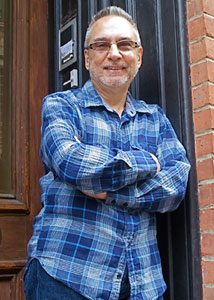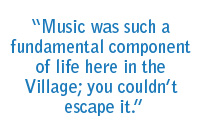 Bill Curreri was born in St. Vincent’s Hospital in 1949. After successful careers in pharmaceutical marketing and academia, Curreri began a new one as a musician with the release of his first album in 2012. His second album, “Son of An American Dream,” has just been released and is generating considerable radio play internationally. Bill has lived on Leroy Street most of his life.
Bill Curreri was born in St. Vincent’s Hospital in 1949. After successful careers in pharmaceutical marketing and academia, Curreri began a new one as a musician with the release of his first album in 2012. His second album, “Son of An American Dream,” has just been released and is generating considerable radio play internationally. Bill has lived on Leroy Street most of his life.
“I was always in love with music,” admits singer-songwriter Bill Curreri. “My first exposure to it was sitting in my grandfather’s lap and listening to Neapolitan music. Then I got into opera, movie scores and, as a teenager, Doo-wop music. And growing up in the Village during the folk era, well, that music really hooked me. In the 60s this neighborhood was teeming, just teeming with musicians!”
While Curreri spent his early years immersed in the local music scene, including a stint as a singer in his brother’s band called “The Village Merchants,” his life took a couple of detours. After a successful career in pharmaceutical marketing and advertising Curreri felt he was finally ready to launch his music career. Then, in 2000, he got a phone call from a friend.
“He begged me to teach remedial reading classes at John Jay College and I agreed,” Curreri says. “I loved it! I got a lot of satisfaction helping my students get to the next level. It paid nothing but it was probably the best ‘job’ I ever had. I did that for 12 years. Finally, one day I was talking to my partner, Lydia, about my music and she said, ‘Maybe it’s time for you to be a little selfish.’ She was right. It was time for me. I reluctantly walked away from the kids but I thanked God for whatever good came out of it.”
Through it all, Curreri had maintained an in-house recording studio and continued to write songs over the years. “I always had a reputation among the musicians I hung with as being a good songwriter,” he says. “I also have a knack for a good melody and a solid hook for a chorus.” All this came to fruition when he released his first album, “Long Time Gone,” in 2012 and now “Son of an American Dream.”
What does the new title mean? “First, it’s a homage to my parents, grandparents, and large extended family,” Curreri says. “They always encouraged us to get a good education and told us we could be anything we wanted to be in this country.” Secondly, it’s a call to younger people to get involved. “When we were kids we knew about current events,” he says. “We were very much wrapped up in them and, in fact, our music was an expression of that. Now kids today can’t even tell you who the Vice President is! I’m trying to tell them that in order to achieve your American dream you’ve got to get involved. You have to figure out for yourself what’s going on in the world and who represents your values.”
 As a child of the Village, what changes resonate most with him? “Back then the Village was not as homogenous,” Curreri remembers. “Our section was essentially an Italian ghetto and we called it ‘the neighborhood.’ However, if you crossed west on Seventh Avenue you were in a totally different Village. We thought the residents there were rich and well educated. Another thing was that the area was crawling with children. Every park, playground, and pool was packed with kids! That’s probably the thing I miss the most. And, finally, I remember the mob influence in the Village. It was a fact of life and we all saw it. Some of the guys I grew up with were attracted to that life but they died young as a result. So the absence of that is definitely a change for the better.”
As a child of the Village, what changes resonate most with him? “Back then the Village was not as homogenous,” Curreri remembers. “Our section was essentially an Italian ghetto and we called it ‘the neighborhood.’ However, if you crossed west on Seventh Avenue you were in a totally different Village. We thought the residents there were rich and well educated. Another thing was that the area was crawling with children. Every park, playground, and pool was packed with kids! That’s probably the thing I miss the most. And, finally, I remember the mob influence in the Village. It was a fact of life and we all saw it. Some of the guys I grew up with were attracted to that life but they died young as a result. So the absence of that is definitely a change for the better.”
And, of course, it was the arts and music in particular that defined the Village for Curreri and which he returns to. “Music was such a fundamental component of life here; you couldn’t escape it,” he says. “But it’s not here today. Instead, the Village is losing its artistic heritage and becoming totally celebrity focused. In the short term, I’m not optimistic for its future.” Then Curreri observes that the “pendulum” of life always swings back and forth. “I’m not discounting a day when the artistic heritage of the Village will return and bring others with it,” he says. “Eventually this area will come back to its roots. As an old-time Village resident I think there’s just too much heritage here that’s makes it so different from the rest of New York. I believe that artists of every ilk will always be attracted to the Village.”
Photo: Maggie Berkvist
